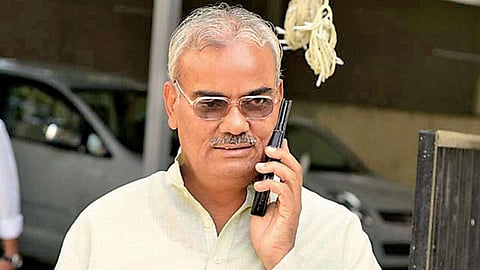
Jaipur- A recent announcement by Education Minister Madan Dilawar regarding the prohibition of teachers from bringing mobile phones to government schools has ignited a heated debate among educators and stakeholders. The directive, which aims to curb distractions and enhance the learning environment, has been met with significant backlash, primarily due to the indispensable role mobile devices play in modern education settings.
Some teachers also assert that this directive is not entirely new. Similar orders were enforced in 2019, albeit with subsequent relaxation by the education department. During that time, limited usage of mobile phones was permitted, particularly during non-class hours or for specific purposes such as uploading school activities like Bal Sabha.
In his statement, Minister Dilawar emphasized the detrimental impact of excessive mobile phone usage among teachers, citing distractions such as monitoring stock markets and unrelated activities that impede their focus on teaching responsibilities.
Consequently, the minister declared a blanket ban on mobile phones within school premises, restricting their possession solely to school principals.
However, this decree has encountered staunch opposition from teachers and educational organizations, who argue that such a measure is impractical and ill-conceived.
Central to their dissent is the indispensable reliance on mobile technology for various educational functions, particularly in the wake of the COVID-19 pandemic, where online teaching and learning became the norm for an extended period.
During the pandemic, educational activities heavily relied on digital platforms, with teachers utilizing mobile devices for conducting classes, marking attendance, disseminating information to parents, and managing administrative tasks. The transition to digital education was a necessity to ensure continuity amidst lockdowns and social distancing measures, rendering mobile phones indispensable tools for educators.
Moreover, teachers contend that banning mobile phones would not only disrupt existing workflows but also regress the education system to outdated methods, necessitating a return to paper-based processes. This shift would not only be cumbersome and time-consuming but also counterproductive to the broader goal of fostering digital literacy and efficiency in education.
The proposed ban has raised concerns about the feasibility of implementing online attendance systems, communication channels, and access to educational resources without mobile devices. Teachers fear that without the convenience and flexibility offered by mobile technology, managing administrative tasks and facilitating learning interactions would become significantly more challenging.
Rekha Jain (pseudo name) , a senior secondary school teacher in Salumber district expressed her reservations regarding the government's decision to ban mobile phones in schools.
Speaking with The Mooknayak, she articulated concerns about the practical implications of such a directive, particularly in the context of the extensive administrative tasks teachers are required to perform.
Jain highlighted the integral role mobile applications play in streamlining various aspects of teaching, including recording attendance, updating syllabus progress, and generating monthly and weekly progress reports mandated by the directorate. " We have to upload every details on the Shala Darpan portal, how can we do all these tasks if mobiles are not allowed to schools," she asks. These tasks, she emphasized, are efficiently managed through mobile apps, which provide convenience and accessibility to teachers.
Speaking to The Mooknayak, Sher Singh, State President of Panchayati Raj Shikshak Sangh, said "As educators, we understand the importance of maintaining focus in the classroom, but a blanket ban on mobile phones disregards the indispensable role they play in streamlining administrative tasks and facilitating effective teaching. Rather than stifling innovation, we should seek solutions that promote responsible usage". The teachers' leader stated that the association would provide a representation to request a review of the mobile phone ban.
Meanwhile, Rajshri Upadhyaya, a private school teacher in Dungarpur, shared her perspective- "In our schools, we are allowed to carry mobile phones, but their usage is restricted during classrooms. We keep them in our lockers and use them during our free time or after school. Mobile phones have become an integral part of life now, and banning them is no solution."
Apart from the directive on mobile phone usage, other directives from the state government in the recent past have also triggered similar reactions within the teaching community. One such directive pertains to the dress code requirements for teachers in schools. According to this directive, male teachers are mandated to wear formal attire, prohibiting the use of T-shirts and jeans. Similarly, female teachers are instructed to adhere to traditional attire such as sarees or salwar suits, with limitations imposed on the wearing of kurtis, long skirts, or jeans.
This particular directive has elicited diverse opinions among educators and stakeholders. Advocates of the dress code argue that it promotes professionalism, discipline, and respect within educational settings. They contend that standardized attire sets a positive example for students and contributes to a conducive learning environment.
However, opponents of the directive argue that it encroaches upon individual freedom and expression. They assert that teachers should have the autonomy to dress comfortably while maintaining professionalism and modesty. Additionally, concerns have been raised regarding the practicality and inclusivity of enforcing specific dress norms, especially in regions with diverse cultural and climatic considerations.
You can also join our WhatsApp group to get premium and selected news of The Mooknayak on WhatsApp. Click here to join the WhatsApp group.